It’s an oft-used cliché but in the case of renowned prog-death-metal crew Cynic, it really is no exaggeration to state that they have never played by the rules. From their 1993 debut ‘Focus’, the prodigious talents of the band were plain for all to see – a deft blend of technical death metal fretboard wizardy and spacious jazz-fusion, it was a release out of the blue that in one swift move, raised the bar for an entire genre. The legacy of this release is still felt today with many bands having experimented with adding fusion elements to a progressive metal template. Nevertheless, few can claim to have pulled it off with quite the aplomb of these innovators.
And then… well, not a lot. It wasn’t until 15 years later that the core trio of Paul Masvidal (Vocals/Guitar), Sean Reinert (Drums) and Sean Malone (Bass) saw fit to finally treat us to a follow-up full length, the dense and glittering ‘Traced in Air’. A period of relative activity has followed – several tours and a stellar EP in 2012 by the name of ‘Carbon Based Anatomy’. Barely pausing for breath, we are now presented with the fourth instalment in the Cynic canon – their third full length, the enigmatically titled ‘Kindly Bent to Free Us’.
Having just treated a select audience to an exclusive preview listening of the forthcoming opus at London’s Black Heart venue, it is a relaxed and obviously proud Paul Masvidal who sips on a pint of ale and talks freely about the latest record. I start by asking him how it feels to finally have a new full-length locked, loaded and ready to go. “It feels good – we delivered it last summer so there’s kind of been some time but yes, it feels… you know, a record is such a big journey, it’s like a lifetime. Especially this one, it’s been years! We’ve been working on it since – well, I mean this material goes WAY back.” So it predates the ‘Carbon Based Anatomy’ material then? “Oh definitely. Carbon was like a hard-right ‘get something out of our system that we were going through’ release – it was kind of like a purge album. We were going through something really hard actually. Business -wise, we had an ex-Manager that came after us legally and it was a nightmare of a situation. A lot of things were crashing down and it was really like a therapeutic purge. It was like I knew I was working on this record (Kindly Bent to Free Us) but I knew that it needed time. It was not ready.”
Was it almost like the album was becoming suffocating? Sometimes when an artist is so close to a record and has spent so much time on it, it can become all-consuming. “It’s so big. And Carbon was so effortless – it was like ‘oh, I get to shift gears and just do THIS thing?’ And it was just a very tight little world that I got to dive into”. There’s definitely a sense of freedom to the Carbon-based Anatomy material – an airiness or ambience – whereas with the newer album there’s a sense of ‘hardness’ to it – a sense of ‘closeness’. It’s dry and direct, it’s like we’re a trio – in your face, that’s the idea. Stripping away all the layers and just going ‘here’s the riff, here’s the bass part, here’s the drum part and then some interesting vocal harmonies!’
Prior to the listening session, Masvidal handed out some very detailed notes relating to the new album. As well as including a synopsis of each track’s lyrical themes and overall sound, there is a summary of the whole ‘feel’ of the album. Within this, Masvidal is keen to emphasise that the album is very much the work of a trio – himself and the two Seans – and you can sense that as the record plays. I put it to him that you can tell sonically that it’s very much the work of three guys.
“Yes.” He replies firmly and enthusiastically. “Yeah, and I like that, it’s kind of like there’s moments where everyone gets showcased and yet we’re just serving the music and the song.” So Cynic is now fully a trio? “Yeah, it feels like a trio. OK, live it could be numerous musicians – especially the older material – but yes, this is definitely a trio record and I kind of wish we were always a trio! I love the idea. I don’t think we ever did play as a trio prior to this. Carbon was ‘trio-y’ but it was also – well, there was a lot of (other stuff going on). I had my friend Amy do some vocal harmonies and I layered the hell out of it with all these guitar synths. There’s a whole world there! I was really into Brian Eno and in this ambient phase during that.”
There are certainly elements of that on the new album. In amongst the by-now trademark passages of finger-bending Masvidalian riffage and the gravity-defying surge of Reinert’s percussion, there are several passages of ambience, slow build/release, a real sense of atmosphere. I ask Paul if this is a synthesis of catharsising the issues of dealing with this ex-Manager and a release with Carbon – are you bringing all of that together?
“Yeah – I mean Carbon really was its own self-contained therapy-world. It was this little record that we just had to get out of our system. This record (KBTFA) itself is kind of… it’s weird. I try to intellectualize it but it really tells YOU (the creator) when its ready and what it needs to do, how these songs – well, they kind of find themselves! You’re just in service of it you know? (chuckling). That’s the beauty of Cynic too, we don’t stick to any specific deadlines or structure.” So you don’t get pressure from labels or anything? “No, no. This project really isn’t something we do to eat or pay our bills, it’s an ‘art for art’s sake’ gig.”
As it should be really. I do worry about bands trapped in that ‘album every two years then a tour’ cycle – particularly as extreme metal ages, I wonder about the number of bands out there who ARE doing this to pay their bills. Given his numerous credits for television soundtrack work, Masvidal is understandably sanguine about the concept. “Right. And there’s something admirable about it and the discipline of doing that and I know how it is as a working musician but Cynic really is not about that.” Nevertheless, is there not a fine line between ‘inspired’ art and ‘working’ art? Pretentious as it sounds, sometimes that pressure from a working cycle can be motivating. Some artists like that and need that ‘kick up the arse’ so to speak! “It’s a combination for me, I feel like there’s this tight ‘pressure’ component that allows for quick decision making, trusting your gut and your instinct. Then there’s this other component – having the patience to let ideas gestate and not thinking that just because you love it right now that it’s necessarily ready. And stepping away – this record had a lot of that where we stepped away, we came back and were like ‘how does it stand now?’ That’s cool because then it’s like you get to really ‘test’ it. “
Aha. So it’s the age-old quandary of self-editing then – which as an artist can be a difficult thing to do. Taking time away from something and then coming back to it. “Yes – ‘is that ready’? Really it’s a fine line where you’re trying to crystallize a sense of a magical component that is the presence of creation and making music but also not over-intellectualizing it and sterilizing it by over-thinking. So it’s a fine… it’s a dance! Stepping away and coming in.” I guess this is particularly important when you’re doing something that has a prog element to it – if there’s any one genre which can occasionally be accused of over-intellectualizing material its prog! “Exactly, yes. And Cynic is a weird band and as much as we had these academic ‘prog’ sensibilities and backgrounds we kind of throw it all out of the window when we write music and just try and get to some core emotional process!”
The P-word. It was bound to happen sooner or later. So come on then, what are Cynic’s primary influences when it comes to prog? Surely Rush and Yes must feature. Masvidal nods firmly. “Oh Rush is huge. I think we grew up on the classics like Yes, King Crimson and Rush, that was kind of like our staple, even some Genesis. And then we were kind of all over the place then got into the ‘metal’ thing and then in late high school/early college we got into jazz and then it was like ‘fuck! Listen to this shit!’ So we started playing in jazz bands and I played in a big band in college and it was just trying to get that in my ears and learn how to play it – and then learning how to incorporate that into this other hybrid of extreme music.” That late 80s/early 90s period of metal was quite exciting, particularly at the more extreme end of the spectrum. There was a lot of merging of styles. “Right – and at the same time whilst trying to write songs! But there was this certain naivety I think in our youth where you have technique and you develop it and you want to prove it to the world. Its like ‘let me show you what I can do’! It’s really transparent I think in younger prog bands when you hear it, it just sounds – there’s no emotion, it’s just technique.”
Continuing on the prog-road – OK, I’m not an expert on modern prog-metal, but from what I have heard, it seems too showy, too mechanical. “Yeah, where’s the heart? You’ve got to drop down (laughs)! At some point, get out of your head.” Indeed.
Going back to what we said earlier, the focus should be the song. I think that’s something that’s always been very clear throughout the progression of Cynic. Look at Traced in Air and Re-Traced (a 5-song curio release with re-worked ‘non-metal’ versions of songs from Traced in Air) – Re-Traced had its critics, but for me, it had taken away some of the decoration and distilled the essence of the ‘songs’. Highlighting the song – the song is there and clear. I thought it worked really well and it’s clear from our conversation that songwriting is a subject close to Masvidal’s heart. “You know it’s funny, it’s like every song from Cynic starts basically as a prog folk song – it’s like acoustic and vocals. It’s this little template of a guitar and vocal song with a basic harmony and chord structure and the melody. It’s such a fine, delicate transition – almost like when someone goes from a screenplay to making their movie – to translate it, to get it to sound right! (Laughs). To interpret that root idea into something tangible and I feel like this record did that in a really transparent and distilled way. I don’t even introduce it to the guys until it’s fully fleshed out as a little acoustic number.” That’s interesting as Cynic are still ostensibly a ‘metal’ band and the idea of a metal band – a progressive metal band at that – writing on an acoustic is intriguing. I can see how that would work, stripping it back you’re not going to get distracted by tapping, sweeping – i.e. show – and can focus on writing the song. “As a skeleton, as a bare bones representation. For me, if you can get that to stand, you’re good! You can go anywhere. If it has legs without all the trappings and ornamentation then you’re good to go, you can go anywhere you want and for us, that’s the fun part. It’s like ‘OK, we’ve got a solid foundation here, let’s have fun now!’ Let Sean start hitting things… “Yeah. Bring in some crazy grooves – and Sean is a naturally complex drummer, his sensibilities are this way. I’ll show him a chord progression and he’ll come up with this groove and it’s like ‘woah!’. OK, let’s do that – I’ll change the chords and strip this guitar part down now and let Malone (bass) drive this section. And that was a lot of the thinking.”
It sounds like there’s a real symbiosis between the three of you, letting things change and adapt. “Oh, it’s constant. Constant. Every song is like this massive, unfolding thing – you have no idea where it’s going to end – but it’s exciting because at the end of the day, everyone’s servicing the song. We’re not caught up in wankery.” So you’ve been working with these guys for over 25 years now – there must be an almost ‘family’-like vibe between you. “It’s like… we’re better off NOT talking. And that’s how we work together generally, there isn’t a lot of over-intellectualizing it’s just completely an innate, unconscious – it’s all music driven. My relationship with Sean (Reinert), although we have a lot in common in some ways, we’re so different as people. And yet musically, there’s a chemistry there that I don’t understand! And Malone and Sean as a rhythm section it’s just totally… bizarre.”
It sounds perfect really – no words, just pure expression. To me, that sounds like the ultimate band experience – to symbiotically create. “Yeah, you just go with it you know? The one thing I know when its working is that when neither of us is necessarily editing each other – we’re just all synchronized. And that’s really how this record was. There wasn’t like ‘can you change that part?’ – 98% of this record was ‘great! Perfect, next section’. It was like everyone was just aligned.” Paul can’t keep the smile from his face as he talks and it’s clear that he is hugely proud of not only his latest record but the band he has worked with for so long. I put this to him. “I just know how it is to work with musicians where you don’t have that and you’re trying to intellectualize something and it’s like you’re trying to find your pocket with them.”
On the subject of playing with different musicians, it feels appropriate now to discuss Paul’s connection with the legend that is Death. Few of you will need reminding that Paul contributed guitar to the seminal Death album from 1990 ‘Human’ and its subsequent tour, firmly cementing his position in the annals of death metal history. What is more surprising is that 23 years later, Paul, Sean (Reinert), legendary bassist Steve DiGorgio and Cynic live guitarist Max Phelps have come together to form ‘Death To All’ – essentially ¾ of the ‘Human’ line-up with Phelps performing the role of Chuck Schuldiner (the legendary, late Death frontman). The band are touring now (indeed, once this interview was concluded both interviewer and interviewee were heading to the Forum up the road for the show), playing a mix of Death classics. Not wanting to dwell on this (after all, this is a Cynic interview) but it feels pertinent to raise with Paul his perspective on this. “Oh well, the Death stuff – because I did that in my late teens – I mean, first off it’s fun and easy to play. It’s not necessarily challenging, it’s more an endurance thing because it’s all 16th notes. So it’s this whole endurance test. But its kind of fun and I feel like I’ve tapped into some aggression that… I knew I had it but its like REALLY getting in touch with it, it’s like ‘this is fucking UGLY and heavy and dark at times. And mean! And I’m gonna just…bleuuuaaarrgghh! It’s like therapy you know?” There has been speculation that Paul’s involvement with DTA might have had an influence on the direction of the newest record – specifically, that it might end up being a bit more ‘death metal’. Having now heard it (and knowing what I know from our conversation earlier), it sounds like it has actually brought all of the influences together. There’s a real ‘physicality’ to the album – when it started I was like ‘bloody hell, it’s almost like having the band in the room!’. “It’s heavy!” Paul confirms excitedly. “That’s the thing, in some ways it’s heavier than all the other stuff we’ve done because for one, it has the least amount of clean guitar parts – it’s pretty much distorted guitar, bass and drums as a trio and there’s a sense of urgency in the rhythms that is propelling it. It’s like ‘this shit’s moving’ and there’s a momentum there. That’s a different sense of heaviness.
At this point, it’s time to drill in more deeply into the elements that constitute ‘Kindly Bent to Free Us’. There are moments of reflection on this record that touch upon post-rock and almost shoegaze-type sounds. The title track in particular has a distinctive coda boasting a mantric bass motif with an almost droning-out guitar wash on top of it. With shoegaze being something of a ‘hot topic’ at the moment thanks to bands such as Alcest, I ask Paul if shoegaze is something he listens to. “Oh I love that” is the emphatic response. “I really am a huge fan of Kevin Shields from My Bloody Valentine. I love his work. I love that stuff man – Slowdive, Curve and even – OK they were a little poppier but Lush. Yes, I love the shoegaze stuff, especially how it was so subtly dissonant and yet like really melodic.” It was quite layered and heavy. Maybe not so much on record but live, those bands can crush… “Oh I know. I mean I’m an outright huge MBV fan. Loveless was a ginormous record for me and I was actually listening to it a lot when ‘Human’ came out. That was like our record on the tour bus.” I have to ask – What did Chuck make of that? “He was not… he didn’t hate it but he was more ‘old-school metal’. That’s his scene you know? He wasn’t too hip to that (shoegaze) movement. It’s cool!” Recently – and as mentioned earlier – that sort of thing has really been picked up on in the extreme metal scene. A number of bands have diversified their influence base and has looked to the ‘wall-of-sound’ approach of shoegaze bands. Is Paul aware of this development? “I know, there’s even ‘black metal shoegaze’ and shit. It’s amazing. It’s so cool. I love that.”
It’s always refreshing to hear from a metal artist who is not afraid to embrace a diverse range of influences. Cynic are obviously a band who are comfortable with drawing from a wellspring of whatever serves to enhance and inspire their artistic vision and Paul is not only at ease with this but visibly enthused when discussing this. I press him further as to what’s currently on the Masvidal ‘listening deck’ right now but it’s clear he’s not that easy to pin down. “It’s funny, when I’m working on a record – and especially this record – I go through periods where I just try not to listen to anything because it’s so noisy in here (he points to his own head for emphasis) that I’m just trying to clear the space and get out whatever’s happening. In general, I’m all over the map, my music collection would confuse you – it’s all over the place! (chuckles).” Well its clear there’s a world music influence in there. “Oh huge. I love world music. Especially there’s a moment where the harmonies in the Bulgarian woman’s vocal choir – do you know that stuff? ‘Voices de Mystere’… Pat Metheny touched on it, he got an Ethiopian vocal choir for the opening track on an album of his called ‘Secret Story’. It’s just this very otherworldly world music – really complex harmonies, so beautiful.”
Time for a crunch question now and one I have been building up to for a while – does Paul see Cynic as a METAL band? It’s a pertinent question, particularly in light of the most recent record which – whilst undoubtedly ‘heavy’ – seems to be edging every further away from traditional sonic trappings of the genre. He hesitates before replying. “I don’t know. I mean, we have metal ‘elements’, we always have, but I don’t know that we’re a true… because I don’t know what ‘metal’ is anymore! I feel like we’re a curious hybrid of a post-rock modern… I don’t know what it is!” OK, let’s make it easier – if someone came up to you and said ‘hey, you play in a band – what kind of music do you play’? “I always say experimental modern rock. To someone off the street. Because if I say ‘metal’, in general they think ‘meathead’. They don’t generally think… well, if you say prog metal, half the people – 70-80% in fact – don’t even know what you’re talking about! (chuckles). So how do you communicate that? So you just say ‘experimental rock’. It keeps it open & loose you know?” You guys were always bracketed in with ‘death metal’ – do keep in touch with the modern Death Metal scene at all? “Not much. Gorguts maybe – we toured with them on the first DTA tour and Luc LeMay (Gorguts frontman) has got some great ideas, I think he’s a really interesting, cutting-edge writer. He’s definitely in his own realm harmonically. And Dysrythmia – you know the guys who play with Gorguts, they have an instrumental metal band. It’s really new stuff, it’s like ‘woah, talk about dissonance!’ – but it makes sense, it’s an acquired taste.” Indeed, there are moments on ‘KBTFA’ where there are sections reminiscent of this approach – the end of ‘Holy Fallout’ for example features some distinctive diatonic dissonance. Has that filtered in by ‘osmosis’ so to speak or is it a more conscious thing? “There is a certain blend of the shoegaze component and the dissonant stuff. I love that – I don’t want things to be PERFECTLY in tune also, you know we’re not big fans of that. It’s like ‘let there be this grey area’ at times. The end of ‘Holy Fallout’ – there is a moment there where I had a couple of other guitar tracks going and it was headache-inducing and I was like ‘oh wait – not yet’. It’s not quite right so we had to find the right level of dissonance. That’s Malone’s favourite track. It’s very ‘stick’-centric too, it’s got very strong Chapman stick on it.”
As for the lyrical side of the new album, Paul’s extensive notes indicate that as much though has gone into the subject matter of the songs as there has into the writing of the songs themselves. Without wishing to go into a ‘track by track’ analysis (which would take HOURS), it’s safe to say, there is a lot of depth to the subjects explored in the album. Is this a ‘concept’ piece so to speak? ‘Carbon-based Anatomy’ had a very definite narrative arc, does KBTFA follow a similar pattern? “I mean not like INTENTIONALLY where I said ‘here’s my story, let me spread it out over the course of eight songs’ but what always happens as a result of a record is that once I look at the body of a work from afar and get to step away from it, I start seeing a thread that I didn’t even consciously know existed. You finally realise what was happening – there is a certain thing happening with the mind that’s a thread there definitely.” There’s a lot of spiritual discussions in the album listening notes – something that struck me was a reference to how the mind can ‘free’ itself. It has generally been my own perspective that the mind can actually be very restricting. This seems to a reference to transcending the restrictions of one’s own mind. “Eventually, yes. I think that’s the idea. To a degree, the mind is an absolute traitor – it’s not to be trusted – it runs on its own without you really doing anything. Thoughts are just doing their ‘thing’, whether we like it or not, they just ‘happen’. I think the idea – at least for me – in terms of spiritual practice is that eventually, you can train it. It’s like training a wild horse you know and you get a hold of it! It doesn’t destroy you anymore. It becomes a source of freedom because you develop a sense of humour, you can have an objectivity about all these moods and states and thoughts. You start realising ‘woah, I’m not NECESSARILY my thoughts’ – these are just thoughts. I can be objective. And then the real question is of course ‘who are you’? And indeed, who are you? If you’re not identifying with all these thoughts then who are you outside of this storyline? And I don’t know, at some degree at least I feel the moments when I’ve touched that it’s like being a child, it’s a magical state of awe, completely in awe of living which is a heightened state of presence, it’s being alive.”
Clearly, this is a topic which the effusive frontman has given a lot of thought. I ask him if he is essentially referring to meditation and a disconnection from the ego in order to transcend the self. He warms to his theme. “I think the goal of meditation is not about arriving anywhere. It’s kind of about accepting what’s going on. You’re not trying to become a ‘better’ meditator, you’re trying to – basically – stop judging yourself! To stop being so hard on yourself, to accept you and be a little bit more gentle with yourself. Developing some compassion for yourself – that’s really the journey.” And the pursuit of ‘truth’? At that, Masvidal’s eyes widen. “Oh man, that’s like… (chuckles) that’s a whole thing right there! There are so many components to that… I feel like it’s – I write, I keep journals, I’ve always been a writer – so it’s one of those things where I’m always trying to strip away and be as honest as possible. And it’s SO hard to do that!!!” Isn’t that one of the principles of Taoism? To get to the absolute true ‘you’? A lot of people find that a terrifying proposition. “It’s terrifying to get there, I know. And I think that’s why we – a lot of times – use medicine to access these more honest places because it helps tear away some of the protection. It can be a tool too, that’s how I see it.” And does this fit into the concepts addressed on this album? Is this almost ‘occult’ sense of ascension tackled? “There’s a thread there, yes. There’s a very specific thing going on there but it’s not so literal – it’s more abstract. It’s a collection of songs that have a certain continuity but I feel like the arc in the shape of the record is as much musical as it is lyrical, it’s all one you know? It’s a big idea, they’re all integrated.”
We are approaching the end of our discussion now so it’s time to pull the conversation back from the edges of the cosmos to the ‘here and now’ so to speak. It’s been an interesting career, time-wise for Cynic. Nothing for the best part of 15 years and then suddenly new recordings, tours, festival appearances. Does Paul enjoy the live aspect of Cynic? “I mean, we haven’t been touring that much. We toured a lot with ‘Traced in Air’ but we’ve been pretty slow these last few years – but personally, if I had it my way, I’d be in the studio all day. I just like to make music and record and create. Touring is – well, there’s a performing aspect to it which is wonderful in that you have this reciprocal dynamic happening in that you get to share and the music gets heard.” From what I’ve seen, you seem to really enjoy it. I saw footage of you playing a festival and you were sitting on the edge of the stage with a massive grin on your face. “Oh I know, it’s a joy, it’s a pleasure to do it but at the same time I like the idea of just making more music and with touring it’s hard to do that at the time. The studio… it’s just a purely creative process. I mean performing is an art form too and its whole other thing but – I don’t know, I just enjoy writing.” Are you guys going to continue touring? I know Malone doesn’t tour with you. “That’s the plan. I mean, he’s like a full-time professor – he writes books and stuff, he’s got a whole other thing going on.” That leads me to another pertinent point – how does the band dovetail with your ‘real’ lives? Is it just simply a case of upping sticks every now and then for a couple of weeks to go on the road? “Yes, we’re talking about stuff now, we’re going to figure it out but we’ll do some runs and start getting out there. I’m itching to play this stuff because live I think it’s going to be so much fun!”
And with that, our conversation is concluded. A few hours later, I bear witness to Masvidal in action with Death To All and the sheer exuberance displayed by the man is perhaps a little at odds with his comments regarding live performances earlier. Peeling off ludicrously technical solos, bouncing around the stage and grinning from ear-to-ear, he comes across as a man born to perform. Whatever the case, it is indisputable that he is clearly dedicated to music, his instrument and his art – his passion throughout our conversation is palpable and this is born out by the enthusiastic intensity demonstrated onstage. It’s remarkable really – twenty-five years into an illustrious career and one of the pioneers of the genre shows no sign of creative burn-out whatsoever and indeed, seems to be enjoying his art with ever-increasing relish. Wherever you stand on the progression of Cynic’s career, this is something to be loudly celebrated.
(Interviewer Frank Allain)

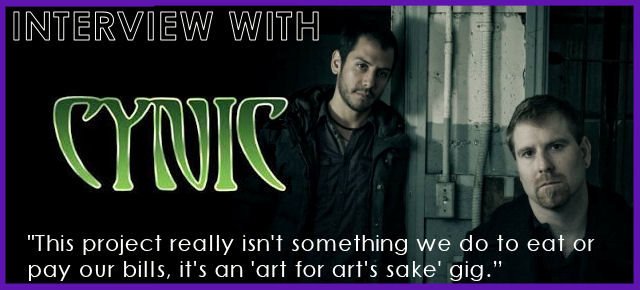
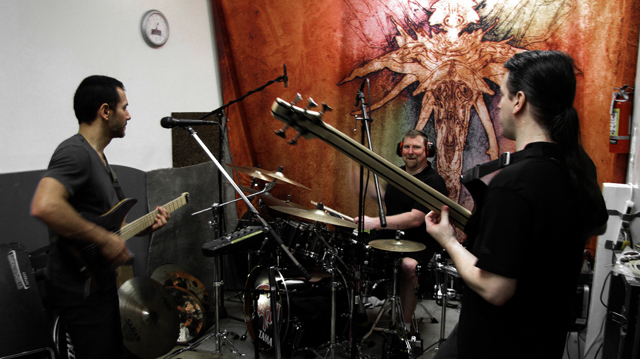
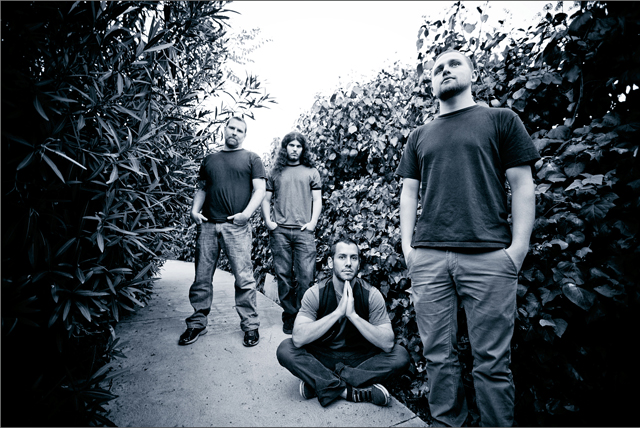
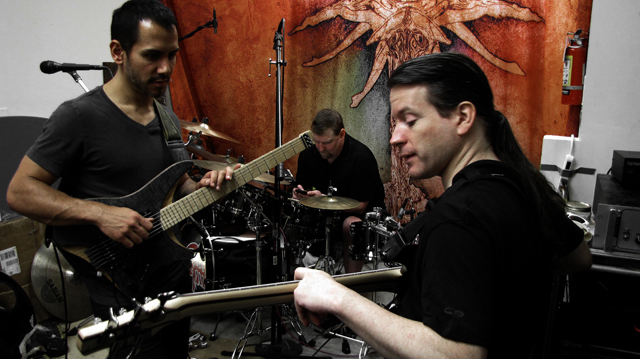
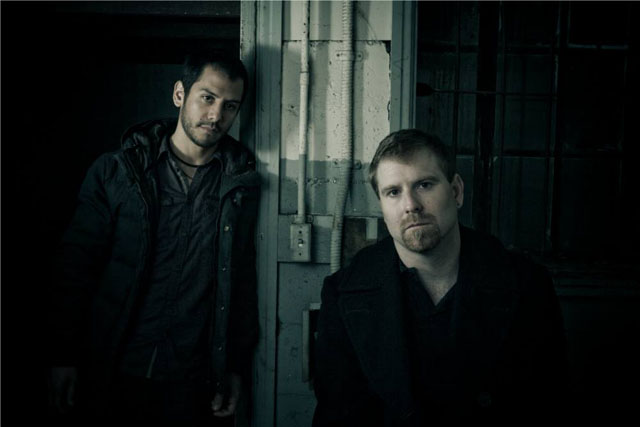
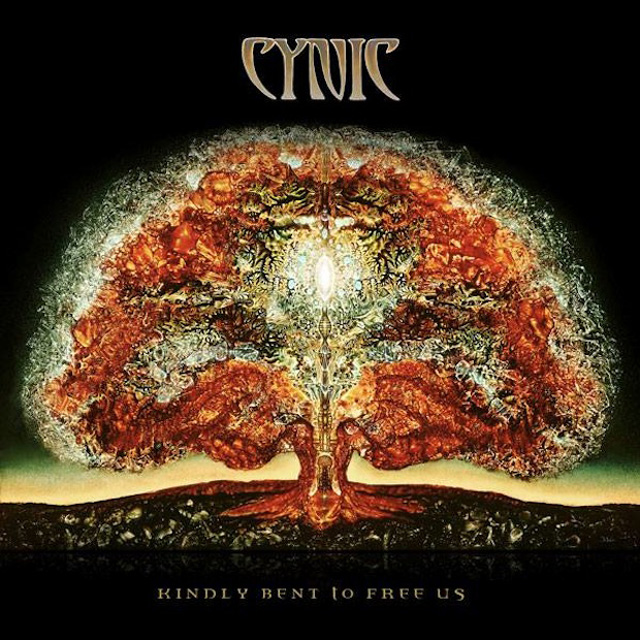
Leave a Reply